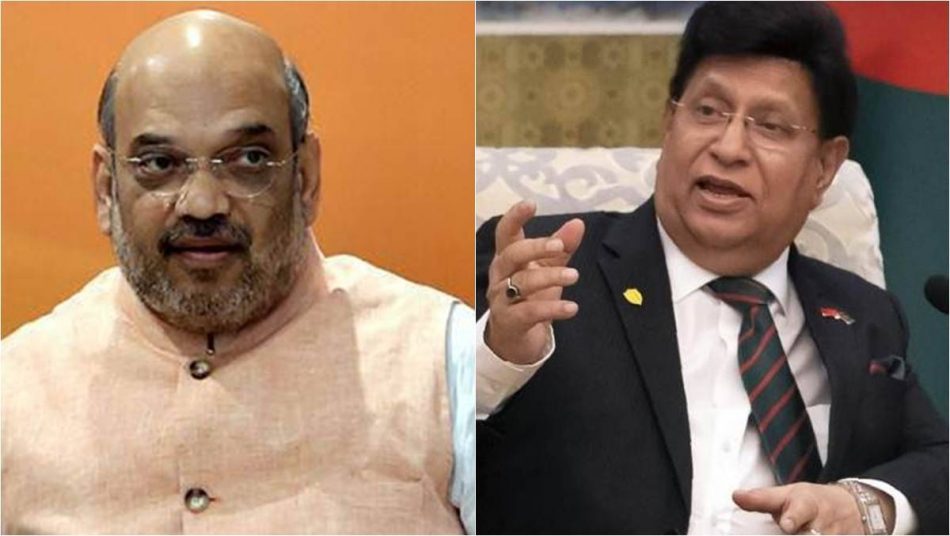Indian Union Home Minister Amit Shah’s anti-Bangladesh remarks are one of his unique selling points to the country’s Hindutva politics. He has mastered his rhetoric carefully over the years, and uses them effectively before any major elections in India.
The anti-Bangladesh hate-mongering rhetoric from the BJP and its messiah Amit Shah during the West Bengal elections are thus painful, but not surprising at all.
No matter how little he knows about Bangladesh, he is efficient in making up stories, even provides expert interviews based on inadequate understandings, and often, based on blatant lies.
In one such interview with Anandabazar Patrika last week, Amit Shah gave a new theory that poor people in Bangladesh are not even getting food and so they are infiltrating into India.
Ruling a country, India, that ranks 94 among 107 countries in Global Hunger Index 2020, Amit Shah accused Bangladesh, a country that ranks 75 in the same index, of poverty and infiltrating into his even poorer country. Why? Amit explained, “When development begins in any ‘backward country’, the richer people get the benefits first, not the poor ones.” And hence, poor Bangladeshis are pouring in India.
As per another of his latest remark, if the BJP wins the elections in the West Bengal, “leave alone illegal immigrants, not even a bird from across the border will be allowed to enter the state.” This bird issue might remind you of his erstwhile obnoxious portrayal of “Bengali immigrants” in India as termites and that he would throw them into the Bay of Bengal.
Many in Bangladesh perhaps wonder if the Indian home minister has any clue about the Global MPI 2018 Report that said India still had around 364 million poor people, largest for any country; and why people would flock from Bangladesh to his poverty-stricken country when Dhaka’s poverty rate dropped as low as 10.5% in the recent years.
How would a union home minister not know this? And if aware of the realities, why would he stick to the lies? Yes, a shrewd politician like Amit Shah would know the data and still stick to his blatant lies because his lies win elections, increase his popularity among the Hindutva crowds.
Often ignored in Dhaka, Shah’s latest interview, however, created quite a buzz in Dhaka. In a sharp response to his allegation about poverty in Bangladesh, the country’s Foreign Minister said, “There are many wise people in the world who do not see even after looking, and do not understand, even after knowing,” FM Momen told the press, adding “But if he [Shah] has said something like that, I would say his knowledge about Bangladesh is ‘very limited’. No one dies of hunger in our country now.”
We asked Shahab Enam Khan, a professor of International Relations, about Amit Shah’s new rhetoric and Bangladesh FM’s response.
“I think our foreign minister is spot on,” said the professor, adding that, “These types of narratives are not new. Indian political parties selectively use Bangladesh in line with domestic appeal for communal and imaginary enemies. This is perhaps to divert attention from governance failure, not surprisingly different from third world country rhetoric.”
The deliberate decision of the BJP to continue spreading misinformation and lies makes sense if Shah’s remark to the BJP social media volunteer is taken into consideration. “We can keep making messages go viral, whether they are real or fake, sweet or sour,” The Wire quoted the BJP messiah in 2018—a clear invitation from the then president to let fake messages to viral.
As the professor says about diverting people’s attention from governance failures to imaginary enemies, he correctly indicates to the BJP’s unstoppable rise in the Indian politics despite the country’s economy going in the drain, an abysmal Covid-19 scenario where thousands of people are losing lives thanks to the wretched Covid management of the BJP regime.
Nothing matters as long as the lies work. So, why wouldn’t Amit Shah tell more lies? No matter what the election outcome is in the West Bengal, the Goebbelsian narratives of Amit Shah and the BJP have no apparent possibilities to stop.
And the sad part is, “Bangladesh in general lacks a political narrative to counter those too,” said professor Khan, and consequently “there is a sharp rise of anti-Indian sentiment beyond political apprehension.”
“The choice lies clearly with Bangladesh’s political community – to let this rhetoric loom large or to make a meaningful pitch so that the bilateral relations can thrive even-handedly.”
*The writer is a journalist from Bangladesh.
April 17, 2021
The viewpoints expressed by the authors do not necessarily reflect the opinions, viewpoints and editorial policies of Aequitas Review.


